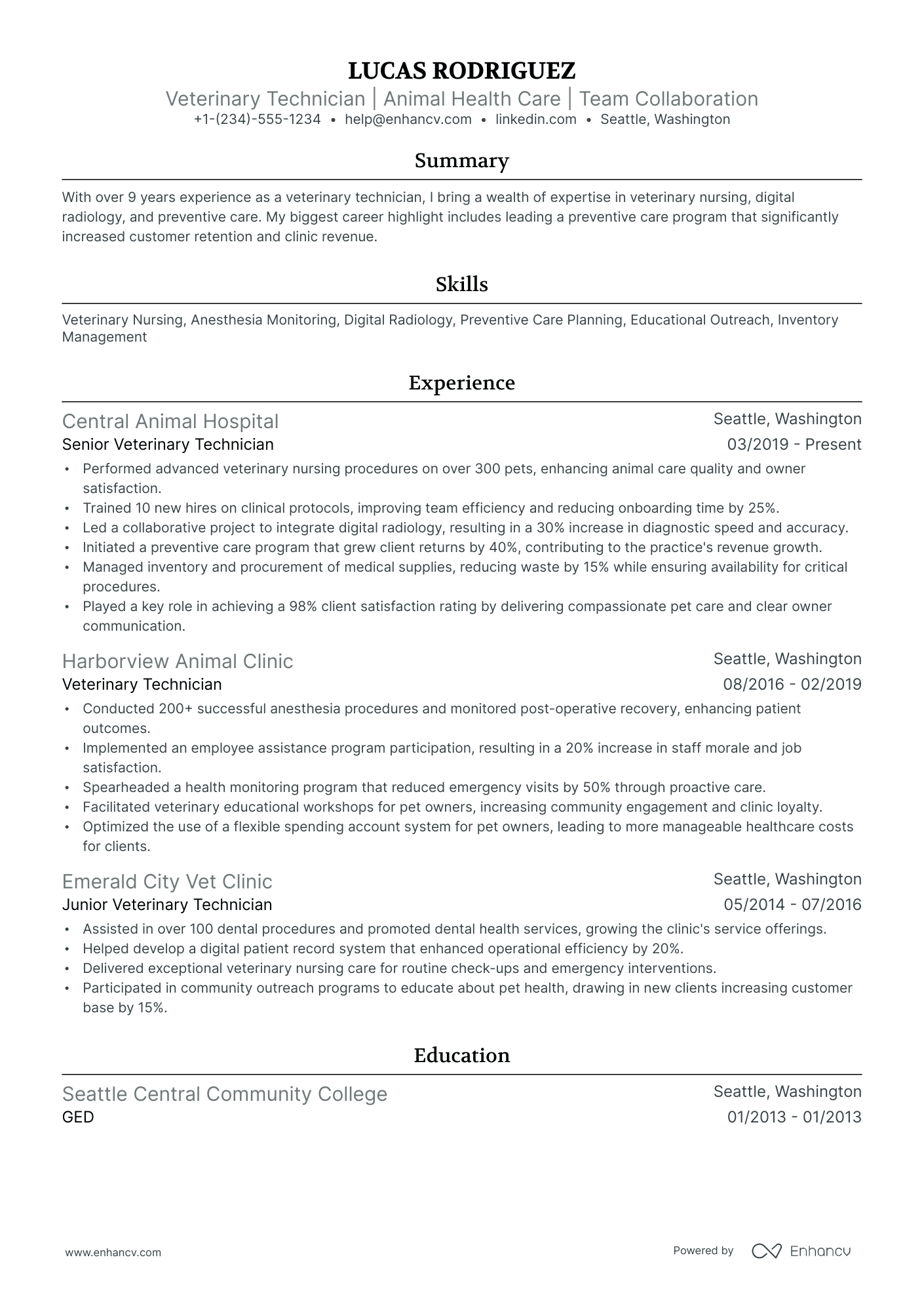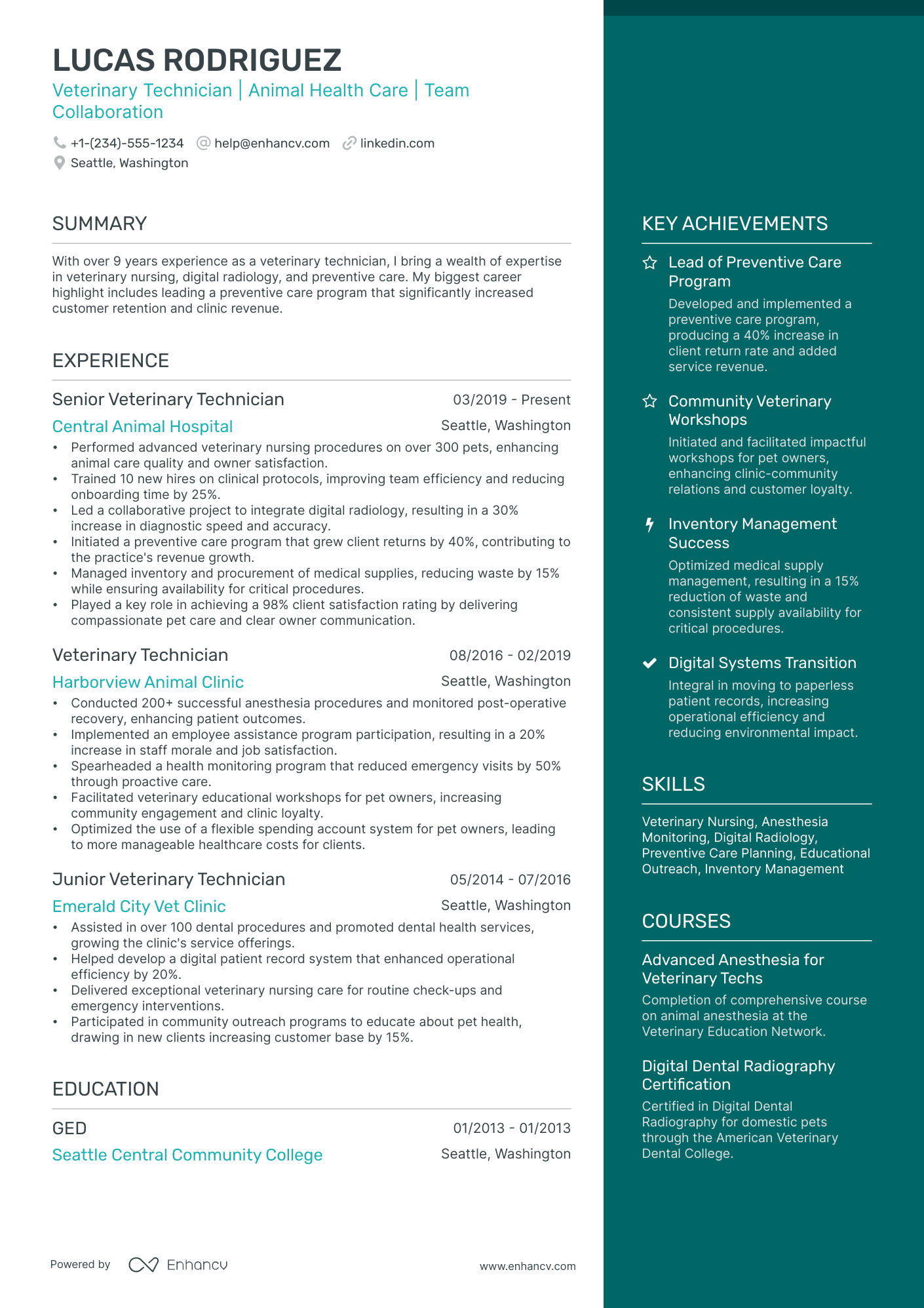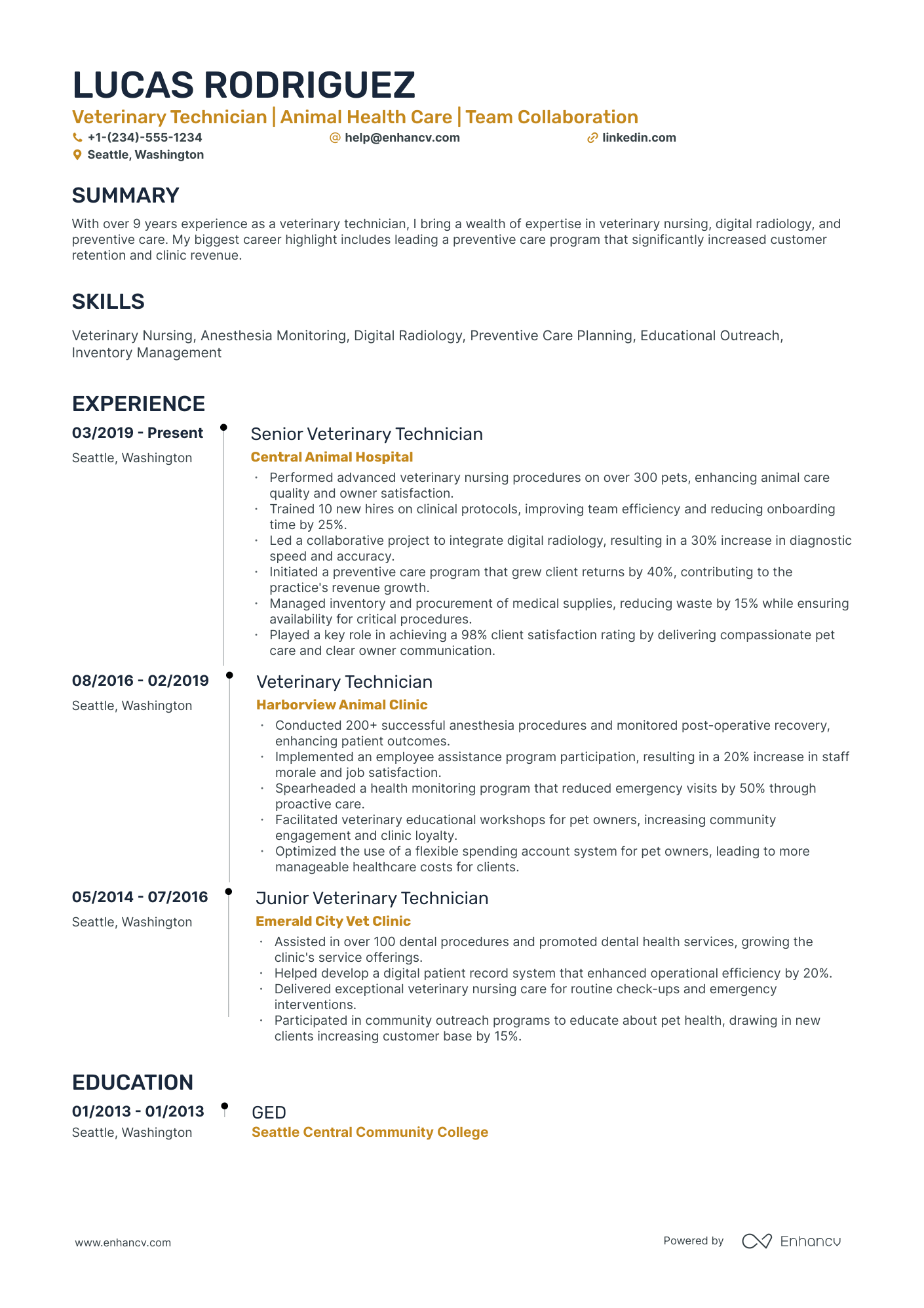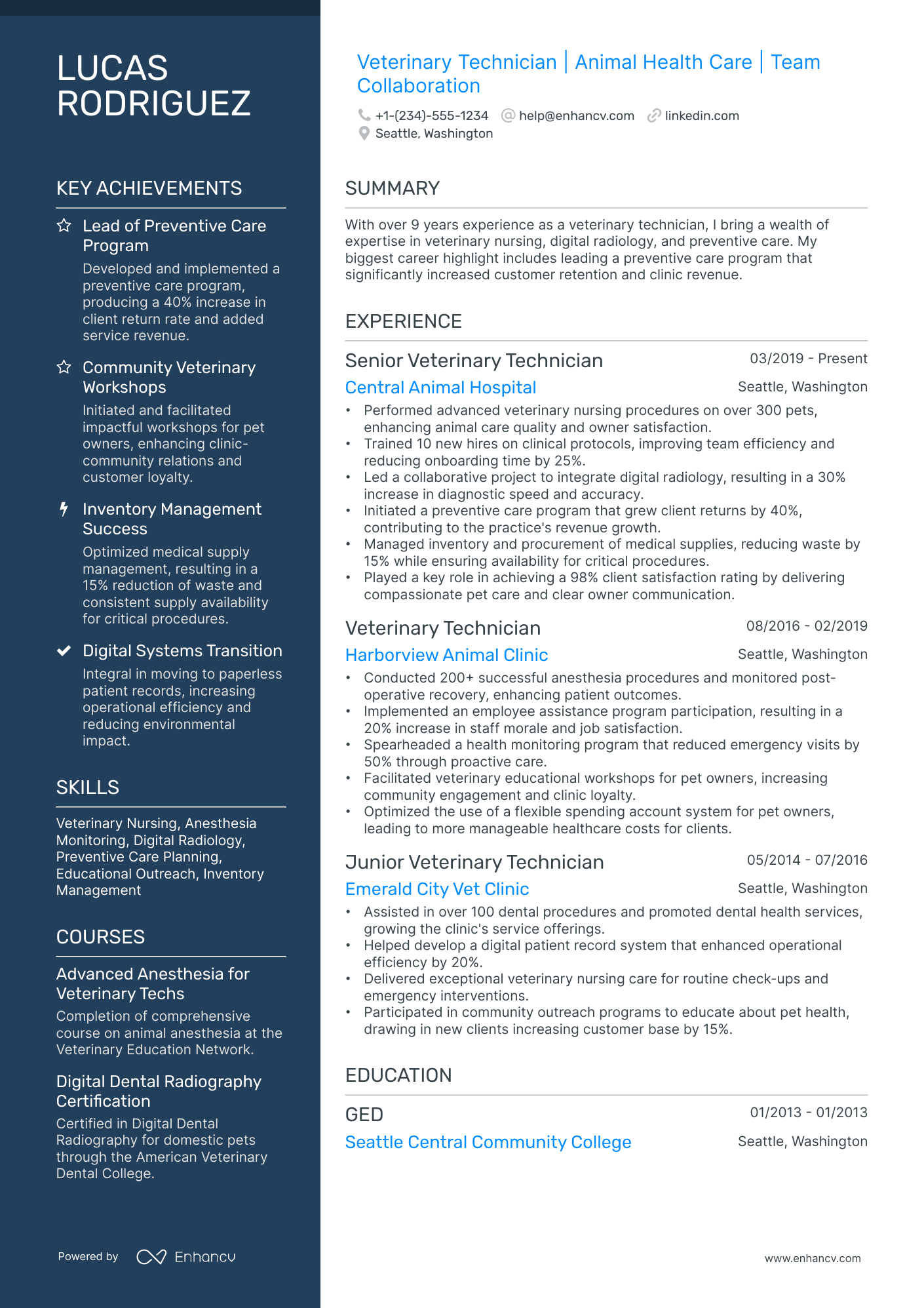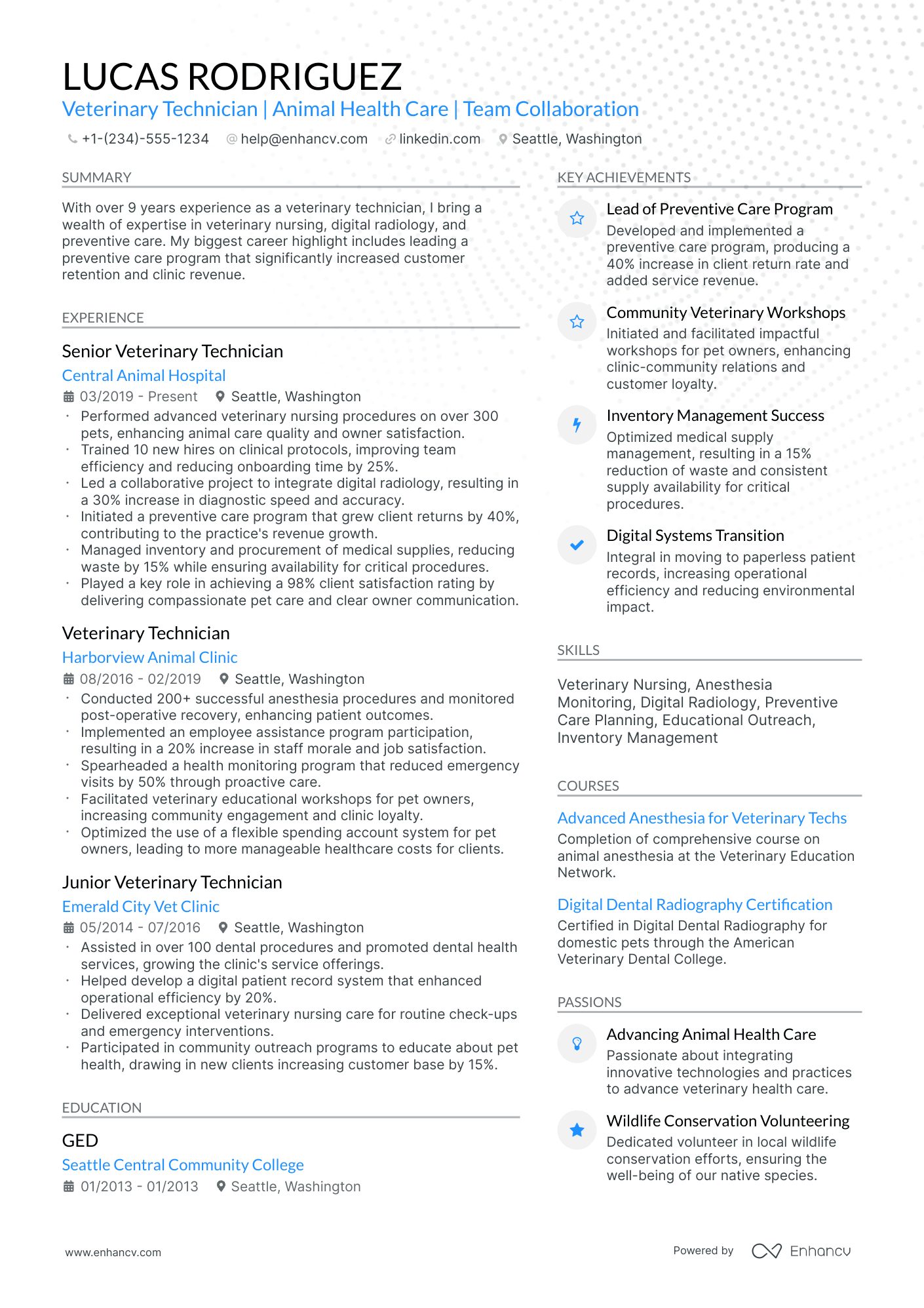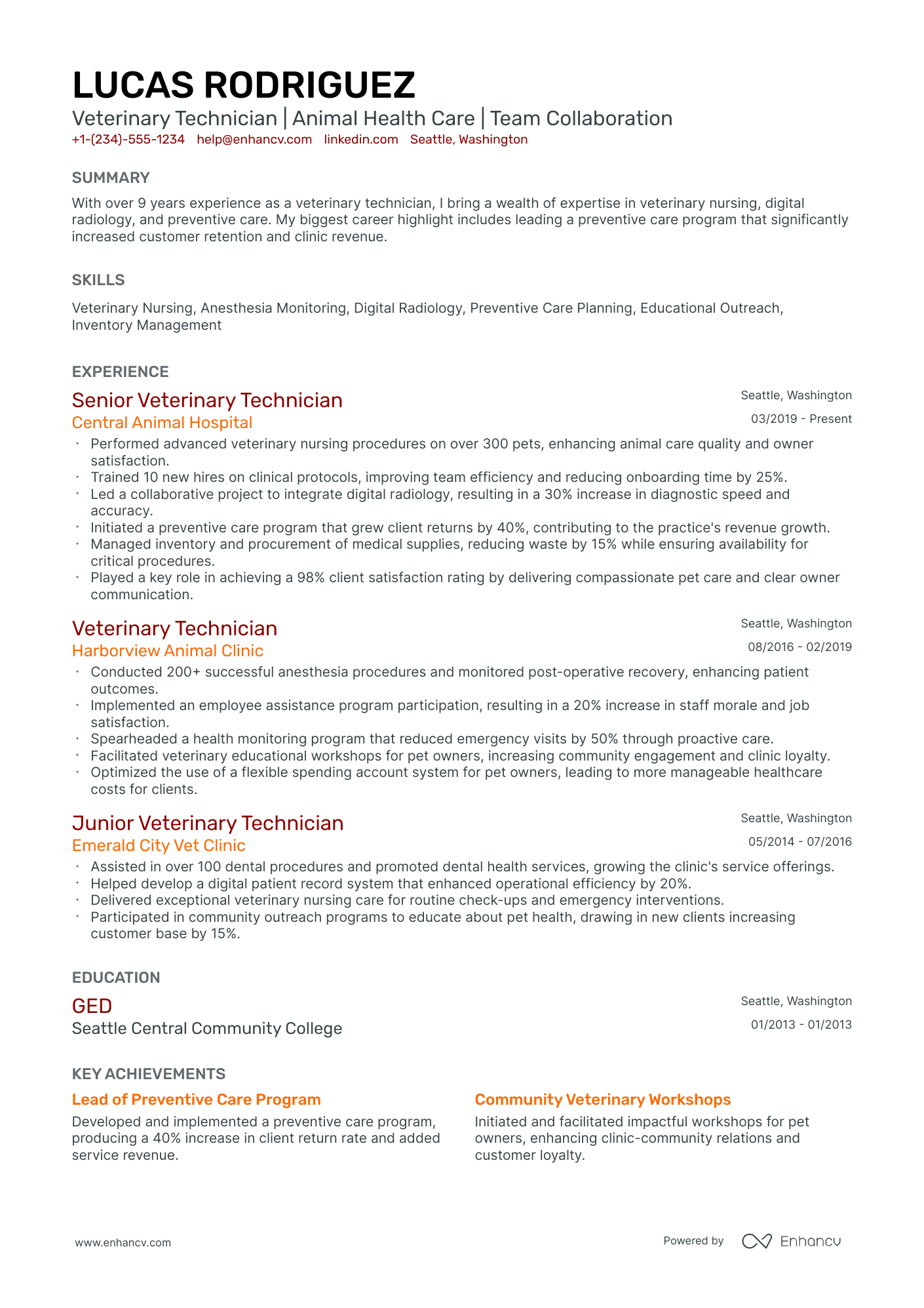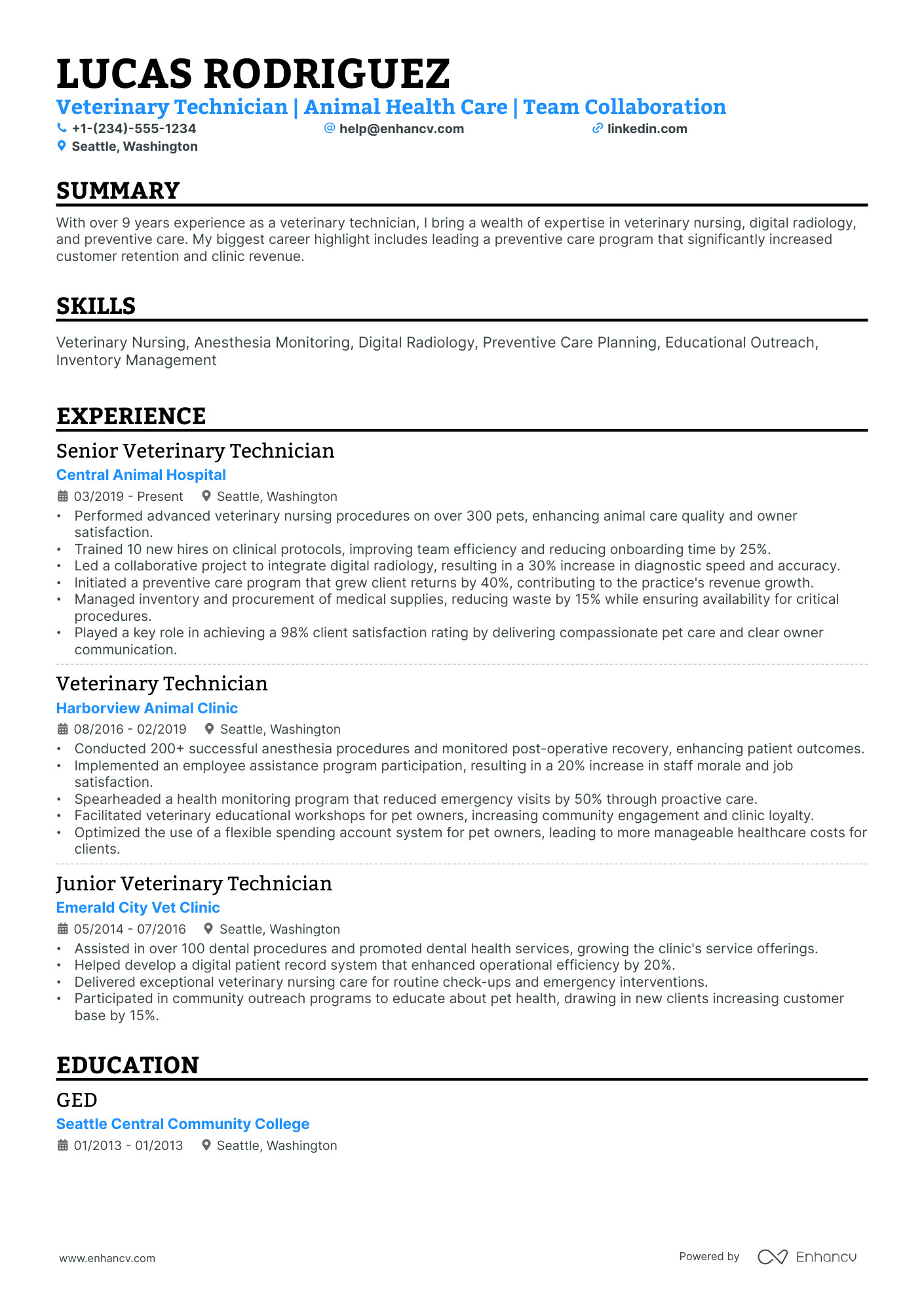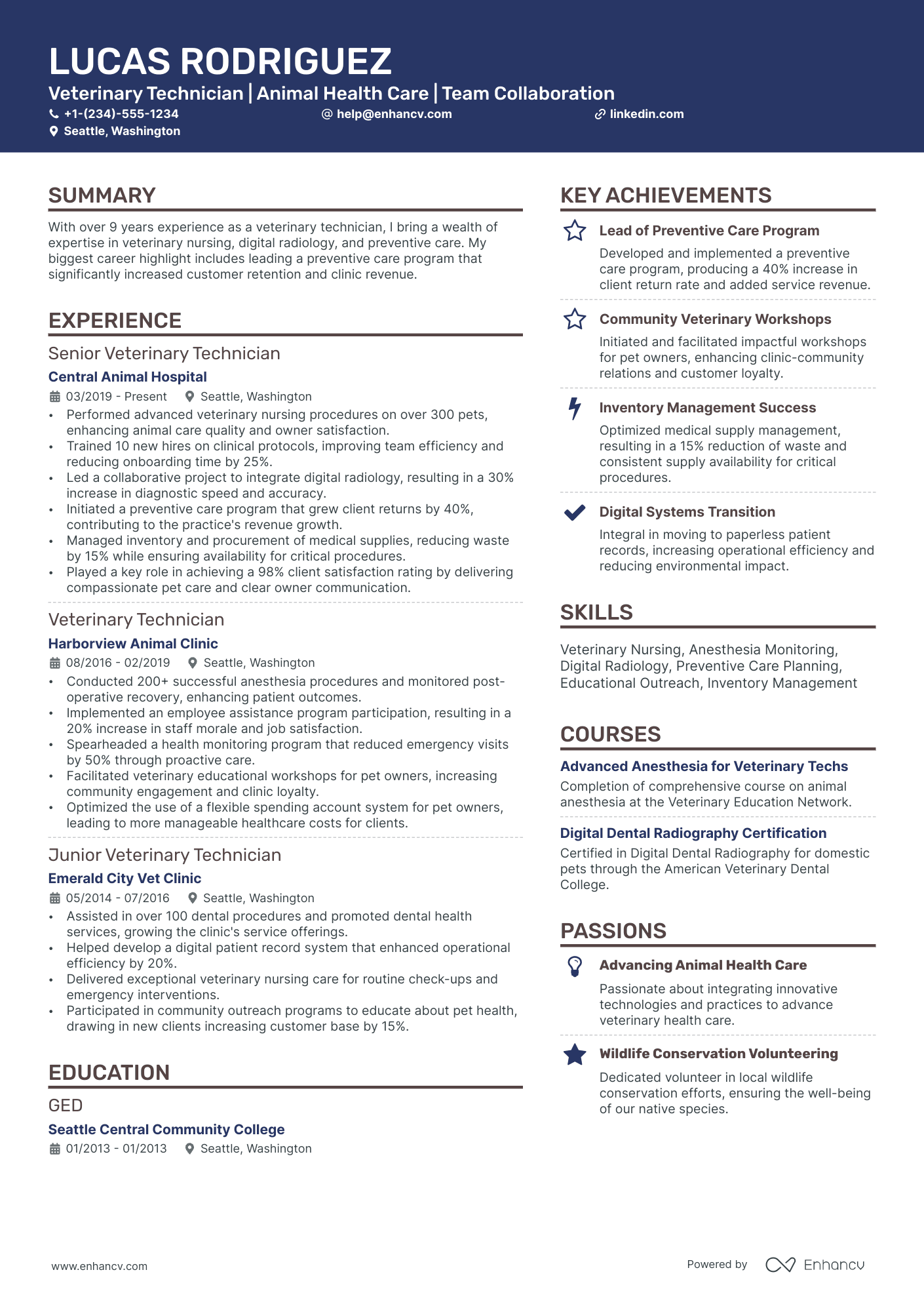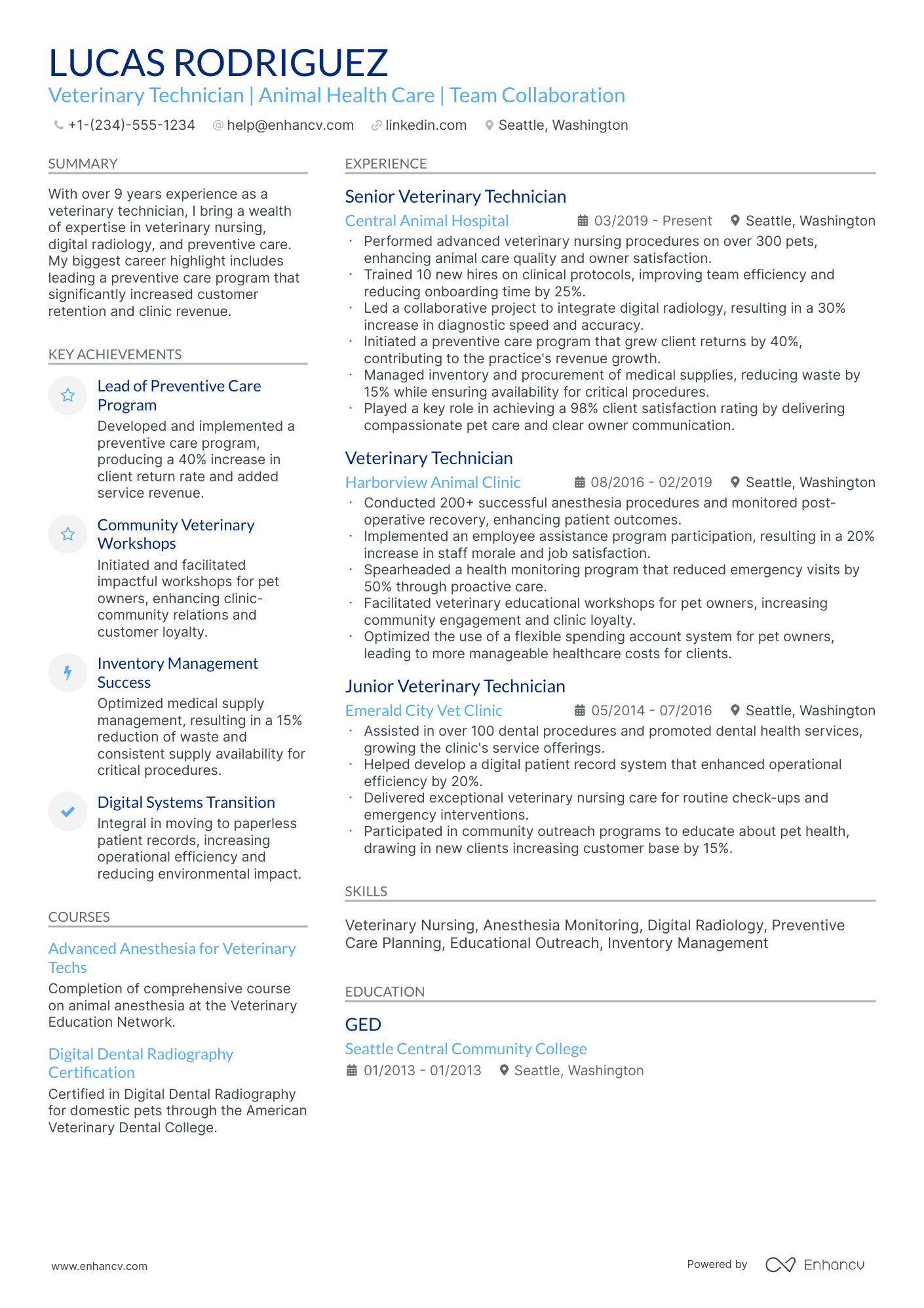As a veterinary nurse, you may struggle to effectively convey the breadth of your hands-on experience with different animal care procedures on your resume. Our guide will provide you with targeted strategies to showcase your expertise, ensuring your resume highlights the diverse skills that set you apart in the field.
- The most effective veterinary nurse resume samples, reflecting on experience and skills.
- +10 simple, yet impactful methods to tailor your veterinary nurse resume to the job advert.
- Using your professional achievements as the North Star to your unique value as a veterinary nurse candidate.
- 'No one cares about your education nowadays …' Let's prove this statement wrong with the best-kept industry secrets to your education and certifications.
If the veterinary nurse resume isn't the right one for you, take a look at other related guides we have:
- Hospital Volunteer Resume Example
- Clinical Director Resume Example
- Clinical Medical Assistant Resume Example
- Retail Pharmacist Resume Example
- Ob Gyn Medical Assistant Resume Example
- Infection Control Nurse Resume Example
- Nicu Nurse Resume Example
- LVN Resume Example
- Pharmacy Manager Resume Example
- ER Nurse Resume Example
Tips and tricks for your veterinary nurse resume format
Before you start writing your resume, you must first consider its look-and-feel - or resume format . Your professional presentation hence should:
- Follow the reverse-chronological resume format , which incroporates the simple logic of listing your latest experience items first. The reverse-chronological format is the perfect choice for candidates who have plenty of relevant (and recent) experience.
- State your intention from the get-go with a clear and concise headline - making it easy for recruiters to allocate your contact details, check out your portfolio, or discover your latest job title.
- Be precise and simple - your resume should be no more than two pages long, representing your experience and skills that are applicable to the veterinary nurse job.
- Ensure your layout is intact by submitting it as a PDF. Thus, your resume sections would stay in place, even when assessed by the Applicant Tracker System (ATS).
Different markets have specific resume styles – a Canadian resume, for instance, may require a different approach.
Upload & Check Your Resume
Drop your resume here or choose a file. PDF & DOCX only. Max 2MB file size.
PRO TIP
Always remember that your veterinary nurse certifications can be quantified across different resume sections, like your experience, summary, or objective. For example, you could include concise details within the expertise bullets of how the specific certificate has improved your on-the-job performance.
Essential sections that should make up your veterinary nurse resume include:
- The header - with your contact details (e.g. email and telephone number), link to your portfolio, and headline
- The summary (or objective) - to spotlight the peaks of your professional career, so far
- The experience section - with up to six bullets per role to detail specific outcomes
- The skills list - to provide a healthy mix between your personal and professional talents
- The education and certification - showing your most relevant degrees and certificates to the veterinary nurse role
What recruiters want to see on your resume:
- Certifications and Licenses (e.g., Registered Veterinary Technician or Certified veterinary nurse)
- Hands-on clinical skills (e.g., venipuncture, anesthesia monitoring, administering medications)
- Experience with various animal species and expertise in animal behavior
- Knowledge of veterinary software and technology (e.g., for patient records or diagnostic tools)
- Communication skills and emotional intelligence for client education and comfort during stressful situations
Quick formula for writing your veterinary nurse resume experience section
Have you ever wondered why recruiters care about your veterinary nurse expertise?
For starters, your past roles show that you've obtained the relevant on-the job training and expertise that'd be useful for the role.
What is more, the resume work experience section isn't just your work history , but:
- shows what you're capable of achieving based on your past success;
- proves your skills with (oftentimes, tangible) achievements;
- highlights the unique value of what it's like to work with you.
To ensure your resume work experience section is as effective as possible, follow this formula:
- start each bullet with a powerful, action verb , followed up by your responsibilities, and your workplace success.
The more details you can include - that are relevant to the job and linked with your skill set - the more likely you are to catch recruiters' attention.
Additionally, you can also scan the job advert for key requirements or buzzwords , which you can quantify across your experience section.
Not sure what we mean by this? Take inspiration from the veterinary nurse resume experience sections below:
- Administered an average of 15 vaccinations per day, adhering to strict medical protocols to ensure the safety and health of each pet.
- Collaborated closely with veterinarians to assist in over 200 successful surgical procedures, enhancing recovery times and patient outcomes.
- Trained and supervised a team of 5 junior veterinary nurses, elevating the quality of care through mentoring and direct guidance.
- Implemented an innovative pet nutrition program that increased recurring client visits by 20% through education and nutritional planning.
- Efficiently managed a busy schedule of up to 30 patient appointments daily, maintaining meticulous records and follow-up care plans.
- Designed and delivered staff training sessions on anesthesia monitoring techniques, improving the skill set of the nursing team.
- Spearheaded the adoption of a digital record-keeping system, cutting down on administrative time by 30% and increasing patient care efficiency.
- Provided empathetic end-of-life care and counseling for over 100 pet owners, demonstrating strong emotional intelligence and bedside manner.
- Took the lead in managing the veterinary pharmacy inventory, resulting in a 10% cost reduction while ensuring essential medications were always in stock.
- Conducted pre-operative assessments on over 500 animals, significantly reducing surgical complications and enhancing the standard of care.
- Developed a continual education program for the nursing team, keeping all members updated with the latest in veterinary medicine and patient care techniques.
- Expertly managed emergency cases, stabilizing patients with life-threatening conditions through swift and decisive actions.
- Coordinated the care of animals undergoing long-term treatment, closely monitoring their progress and adjusting care plans accordingly for optimal recovery.
- Played a significant role in establishing a community outreach program that offered free spay/neuter services, servicing over 300 animals and promoting pet health awareness.
- Assisted in research and data collection for a study on feline diabetes, contributing to a better understanding of the illness in the veterinary community.
- Led the implementation of a pain management protocol that provided relief for post-surgical patients and was subsequently adopted as a practice standard.
- Managed wound care for over 200 animals with a 95% recovery rate, demonstrating exceptional skill in veterinary nursing practices.
- Initiated a pet weight management clinic that advised and supported over 150 pet owners, leading to healthier pets and increased client satisfaction.
- Integral in developing a preventative care program, increasing the number of annual wellness exams by 25%, and catching early signs of disease.
- Orchestrated the triage process during peak hours, ensuring that critical patients received immediate attention and care.
- Fostered a teamwork-focused environment that improved clinic morale and workflow, resulting in a 15% increase in daily patient capacity.
- Played a pivotal role in a successful accreditation process for the clinic, meeting all the stringent healthcare standards outlined by the veterinary board.
- Delivered exceptional patient care to over 4000 pets, maintaining a client satisfaction rate of over 98% throughout my tenure.
- Co-authored a published article on innovative veterinary nursing techniques in a peer-reviewed journal, sharing knowledge with the wider professional community.
- Managed anesthesia for a complex orthopedic surgery series, which achieved a 100% success rate in patient recovery and mobility restoration.
- Organized community vaccination drives that serviced over 800 pets, greatly increasing the regional herd immunity against common infectious diseases.
- Mentored and trained 10 new veterinary nursing staff, ensuring high standards of care and continuity of service within the clinic.
- Streamlined the diagnostic imaging process, reducing wait times by half and facilitating faster diagnosis for over 2,500 cases.
- Developed a successful pet rehabilitation program that helped over 200 animals regain function and quality of life after surgery or injury.
- Championed an initiative to integrate telehealth consultations into the practice, increasing accessibility for clients and boosting appointment numbers by 18%.
Quantifying impact on your resume
- Include the number of patients you manage daily to demonstrate your ability to handle a high-volume workload efficiently.
- List the percentage of successful post-operative recovery cases you've been involved with to showcase your skill in assisting with surgeries and post-care treatment.
- Mention the quantity of clinical procedures you are skilled in to emphasize the breadth of your technical expertise.
- Specify the reduction in waiting times or improvement in practice efficiency due to workflow optimizations you implemented.
- Provide figures for the amount of veterinary pharmaceuticals you manage or order, indicating your reliability in inventory management.
- Quote any increase in client satisfaction scores or positive feedback received to highlight your dedication to customer service and patient care.
- Document any training programs you've led or the number of new staff you've mentored to establish your leadership and training abilities.
- State the number of years of experience you have working in veterinary medicine to illustrate your long-term commitment to the field.
Action verbs for your veterinary nurse resume
What can candidates do about their resume, if they have no experience
Job requirements can sometimes be answered by other elements you could make more prominent in your veterinary nurse resume.
Thus, you'd be substituting your lack of experience with your relevant:
- Education with details of skills you've obtained that align with the job
- Internships and short-term jobs that are once more dedicated to putting your expertise in the spotlight
- Skills section answering basic and - potentially - more specific job qualifications
- Strengths or accomplishments to show the unique value you present, even as a candidate with less or no professional experience in the industry.
Recommended reads:
PRO TIP
List all your relevant higher education degrees within your resume in reverse chronological order (starting with the latest). There are cases when your PhD in a particular field could help you stand apart from other candidates.
Veterinary nurse resume skills section: writing about your hard skills and soft skills
Recruiters always care about the skill set you'd bring about to the veterinary nurse role. That's why it's a good idea to curate yours wisely, integrating both hard (or technical) and soft skills. Hard skills are the technology and software you're apt at using - these show your suitability for the technical aspect of the role. They are easy to track via your experience, certifications, and various resume sections. Your soft skills are those personality traits you've gained over time that show how you'd perform in the specific team, etc. Soft skills are more difficult to qualify but are definitely worth it - as they make you stand out and show your adaptability to new environments. How do you build the skills section of your resume? Best practices point that you could:
- Include up to five or six skills in the section as keywords to align with the advert.
- Create a specific technical skills section to highlight your hard skills aptitude.
- Align the culture of the company you're applying to with your soft skills to determine which ones should be more prominent in your skills section.
- Make sure you answer majority of the job requirements that are in the advert within your skills section.
A veterinary nurse's resume requires a specific skill set that balances both industry-specific hard skills with personal, soft skills. Discover the perfect mix for the veterinary nurse role from our list:
Top skills for your veterinary nurse resume:
Veterinary software (e.g., AVImark, eVetPractice)
Anesthesia monitoring equipment
Laboratory diagnostic tools (e.g., hematology analyzers)
Radiology equipment (e.g., X-ray machines)
Surgical instruments and tools
IV (intravenous) therapy administration
Pharmacy management systems
Medical imaging software
Dental equipment and tools
Animal restraint techniques
Communication skills
Empathy and compassion
Attention to detail
Time management
Teamwork and collaboration
Problem-solving skills
Stress management
Adaptability
Customer service orientation
Critical thinking
PRO TIP
List your educational qualifications and certifications in reverse chronological order.
The importance of your certifications and education on your veterinary nurse resume
Pay attention to the resume education section . It can offer clues about your skills and experiences that align with the job.
- List only tertiary education details, including the institution and dates.
- Mention your expected graduation date if you're currently studying.
- Exclude degrees unrelated to the job or field.
- Describe your education if it allows you to highlight your achievements further.
Your professional qualifications: certificates and education play a crucial role in your veterinary nurse application. They showcase your dedication to gaining the best expertise and know-how in the field. Include any diplomas and certificates that are:
- Listed within the job requirements or could make your application stand out
- Niche to your industry and require plenty of effort to obtain
- Helping you prepare for professional growth with forward-facing know-how
- Relevant to the veterinary nurse job - make sure to include the name of the certificate, institution you've obtained it at, and dates
Both your certificates and education section need to add further value to your application. That's why we've dedicated this next list just for you - check out some of the most popular veterinary nurse certificates to include on your resume:
The top 5 certifications for your veterinary nurse resume:
- Certified Veterinary Technician (CVT) - National Association of Veterinary Technicians in America (NAVTA)
- Registered Veterinary Technician (RVT) - State Veterinary Medical Board
- Licensed Veterinary Technician (LVT) - State Veterinary Medical Board
- Veterinary Technician Specialist (VTS) - Various veterinary technician specialty academies as recognized by NAVTA
- Animal Care and Service Worker Certificate - Professional organizations or community colleges
PRO TIP
If you happen to have some basic certificates, don't invest too much of your veterinary nurse resume real estate in them. Instead, list them within the skills section or as part of your relevant experience. This way you'd ensure you meet all job requirements while dedicating your certificates to only the most in-demand certification across the industry.
Recommended reads:
Should you write a resume summary or an objective?
No need to research social media or ask ChatGPT to find out if the summary or objective is right for your veterinary nurse resume.
- Experienced candidates always tend to go for resume summaries. The summary is a three to five sentence long paragraph that narrates your career highlights and aligns your experience to the role. In it you can add your top skills and career achievements that are most impressive.
- Junior professionals or those making a career change, should write a resume objective. These shouldn't be longer than five sentences and should detail your career goals . Basically, how you see yourself growing in the current position and how would your experience or skill set could help out your potential employers.
Think of both the resume summary and objective as your opportunity to put your best foot forward - from the get go - answering job requirements with skills.
Use the below real-world veterinary nurse professional statements as inspiration for writing your resume summary or objective.
Resume summaries for a veterinary nurse job
- With over 8 years of dedicated experience as a veterinary nurse in high-volume animal hospitals, I bring a wealth of knowledge in pre and post-operative care, emergency response, and medication administration. Recognized for implementing a highly effective vaccination program, reducing communicable disease cases by 25% within the community.
- As a former paramedic seeking to transfer my 10-year emergency care expertise into veterinary nursing, I’m adept at quickly assessing situations and providing critical support. I've honed skills crucial for veterinary settings, such as administering IV lines and managing trauma cases, underscoring my adaptability and commitment to animal welfare.
- With a 5-year career as a zoological technician, I'm poised to transition into veterinary nursing, bringing a deep understanding of exotic animal care and habitat management. My hands-on experience with species-specific nutrition and disease management aligns well with the demands of providing high-quality veterinary care.
- Passionate about animal care, I have honed my skills in surgical assistance, radiography, and laboratory work over the last 6 years as a veterinary nurse, achieving a 95% success rate in pre-operative preparations and postoperative recoveries, thereby enhancing the overall efficacy of veterinary procedures in my current practice.
- Seeking to leverage my strong commitment to animal health and welfare in a dynamic new setting as a veterinary nurse, where I can apply my recent certification and knowledge gained from rigorous internship experiences. Eager to contribute to effective veterinary teams and broaden my hands-on skills in a practical environment.
- Aiming to embark on a career as a veterinary nurse where I can utilize my Bachelor's degree in Animal Science and recent volunteer experiences at local shelters. Keen to develop my clinical skills in a supportive environment while contributing positively to animal care and client education initiatives.
Optimize your resume summary and objective for ATS
Drop your resume here or choose a file.
PDF & DOCX only. Max 2MB file size.
More relevant sections for your veterinary nurse resume
Perhaps you feel that your current resume could make use of a few more details that could put your expertise and personality in the spotlight.
We recommend you add some of these sections for a memorable first impression on recruiters:
- Projects - you could also feature noteworthy ones you've done in your free time;
- Awards - showcasing the impact and recognition your work has across the industry;
- Volunteering - the social causes you care the most about and the soft skills they've helped you sustain and grow;
- Personality resume section - hobbies, interests, favorite quote/books, etc. could help recruiters gain an even better understanding of who you are.
Key takeaways
- Your resume layout plays an important role in presenting your key information in a systematic, strategic manner;
- Use all key resume sections (summary or objective; experience; skills; education and certification) to ensure you’ve shown to recruiters just how your expertise aligns with the role and why you're the best candidate;
- Be specific about listing a particular skill or responsibility you've had by detailing how this has helped the role or organization grow;
- Your personality should shine through your resume via the interests or hobbies, and strengths or accomplishments skills sections;
- Certifications go to provide further accreditation to your technical capabilities, so make sure you've included them within your resume.
